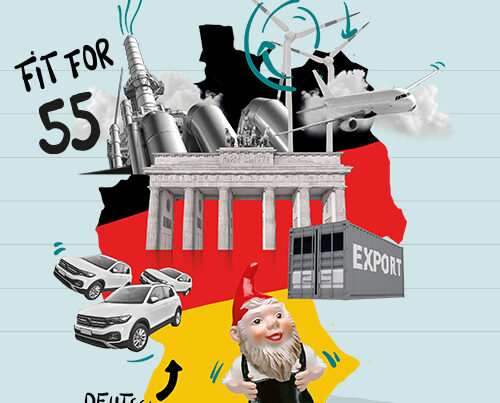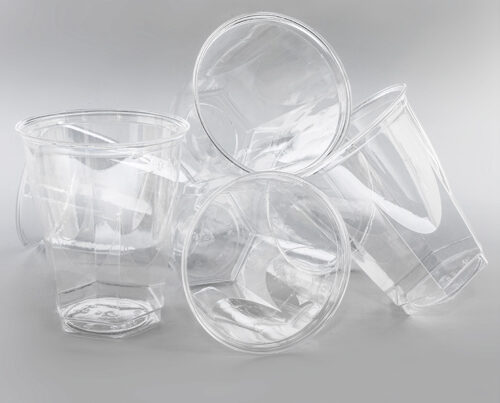Is a hard Brexit imminent?
While REMONDIS AKTUELL’s editorial team were putting the final touches to this latest issue at the company’s head office in Lünen, time was gradually running out in London, a good 500 kilometres due west, for Westminster to secure an orderly Brexit. 23 days before the UK is due to leave the EU, there is still no sustainable compromise in sight. A hard Brexit is appearing more and more likely. Uncertainty is growing – in the European waste management industry as well. REMONDIS also has branches in the UK. We spoke to Steve Patterson, managing director of REMONDIS UK, to find out how he thinks things will progress.

Steve Patterson, Managing Director of REMONDIS UK
What’s going to happen to waste exports?
In a letter to the House of Lords sent at the beginning of 2019, Environment Secretary Michael Gove stressed that the majority of the notified waste exports from the UK will continue to be able to be shipped to the EU. In his letter, he wrote: “UK regulators have made substantial progress in agreeing with EU counterparts that shipments of notified waste which had previously received consent can, in a no deal scenario, continue to be shipped with no requirement for a new application by UK exporters.” Having said that, there is a great deal of insecurity among European partners regarding Brexit. Steve Patterson, managing director REMONDIS UK, put things into perspective for us.
Interview with Steve Patterson
Steve, regardless of your own personal opinion, what is your view of Brexit from a professional point of view?
Steve Patterson: First of all, we have to respect the decision made by a narrow majority of the people in the UK, whether we like it or not. After all, that is how democracy works. However, implementing this decision in detail is turning out to be a lot harder than most of us had expected. In particular, issues like the unobstructed trans-frontier shipment of waste didn’t seem to have been on anybody’s radar. Now we need to make sure we can prevent a state of emergency and ensure the free flow of waste material and commodities across borders.
The British environment secretary Michael Gove is playing down the possible consequences of Brexit for the recycling and waste industry. ‘Business as usual’ seems to be his current motto. Do you share his optimism?
Steve Patterson: I do believe that common sense will prevail in the end. Regardless of their outward optimism, however, the British Ministry of Environment is still preparing for possible bottlenecks. They’ve been looking for suitable landfills in the South of England to take any waste that doesn’t make it out of the country. The Environment Secretary has also announced that the volume of the approved storage areas might be extended at short notice in certain cases. In that respect, the motto is more like ‘hope for the best but prepare for the worst’.
And what would be the worst case scenario?
Steve Patterson: Technically, in the event of a hard Brexit, we could face problems with the exporting of waste and materials across our borders. While the regulators have stated that the necessary shipment permissions (Trans-Frontier Shipment Notifications) will remain valid, we’re still unclear how the customs controls will work and what additional costs and delays we could face. As everyone knows this would cause disruption and potentially a cost increase over utilising UK outlets for disposal – most likely landfill, as we don’t have the incineration capacity to cover all exported waste. This additional expense would lead to cost increases for customers as the industry adapted to the change. While the UK authorities have taken the view that waste export is a service and thus is tariff free, this position may not be accepted by receiving countries and it is currently unclear what customs tariff may be applied to the logistic element of the export.
How big a problem is that?
Steve Patterson: The UK mainly exports refuse derived fuel (RDF) to continental Europe. About 3.6 million tons a year. Every month, around 40,000 tons are shipped through the port of Dover alone. And that’s just 15% of the total amount. If that material were to pile up on the roads to the ports, we’d have a major problem. However, there is room for optimism. Most of our exports from the UK are shipped to Sweden and the Netherlands. Sweden has now agreed that we can continue to export under the current TFS without the need for a new TFS in the event of a hard Brexit. This is good news and if the Netherlands and Germany agree this will put us in a better situation if a hard Brexit occurs. The receiving authorities in countries accepting RDF have generally all accepted this principle now. Around 98% of the RDF flow will not be affected by any changes in the TFS documentation. The current issue is how the customs position will be managed i.e. how we will achieve clearance at the port, what documents are required and what tariffs or duties might apply.
Do you expect a long-term impact on the British-European circular economy?
Steve Patterson: Economic turmoil is never good for long-term investments, regardless whether it is caused by Brexit or a general economic downturn. If the economic downsides can be limited through a ‘softer’ Brexit, then we should be able to continue the circular economy journey. Recycling and the circular economy have a higher profile in the UK than ever and my belief is that the public will want to see the UK continue these developments. In the longer term, my view is that after some changes – maybe a delay, a new election or even a change in political leadership – we will enter a transitional period and spend a number of years rebuilding many of the systems and processes that we will lose through Brexit. I hope that the impact of Brexit will be a bump in the road for our industry in the UK rather than something more severe.
Image credits: image 1: Getty Images: Adam Gault; image 2: © REMONDIS











